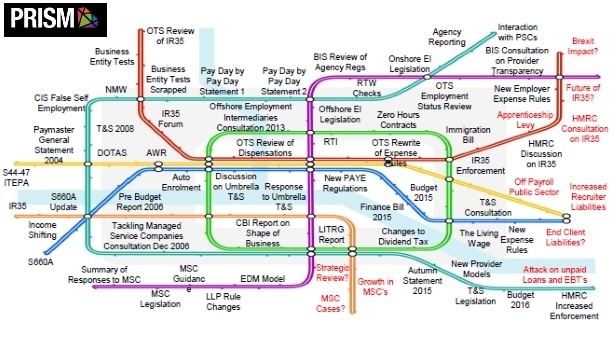Trade body PRISM needs your help to support a strategic review into the contracting sector with the aim of fixing inconsistencies in the tax system and to combat the Government’s ‘sticking plaster’ approach to legislation which continues to adversely affect the contracting workforce.
Calls for Government review ‘falling on deaf ears’
PRISM has been actively campaigning for a Government review over recent months, gaining broad cross-party support from within Parliament. This has resulted in 55 MPs signing an open letter to the former Chancellor as well as efforts from the Scottish National Party (SNP) to instate a clause into the Finance Bill ordering a labour market review.
However, speaking at the Brave New World seminar last week, PRISM CEO Crawford Temple said that efforts to lobby Government haven’t yielded the desired outcome, commenting: “We’re pushing for this strategic review, but it’s falling on deaf ears. If Government won’t do it, we will.”
The wide-ranging review will require the support of industry contracting providers. You can help drive awareness by alerting your umbrella or accounting provider.
Solid factual evidence needed to drive action
Temple emphasised the need for solid facts over anecdotal evidence, claiming this is the only way to ensure policymakers stop their ‘sticking plaster’ approach to legislation.
“Nobody’s looking at anything in its entirety. It’s all silo mentality. Policymakers identify problems individually and address each problem by putting another complex layer of legislation on top of it.” He added: “Some of these rules are creating false employment, so we need to make sure that the rules are fit for purpose.”
Contractor taxes need simplification
To illustrate the complexity of the tax landscape, Temple presented the map below detailing the various consultations and subsequent legislation that have impacted on the contract sector since IR35 was introduced, adding: “The layman has no chance of understanding the tax rules.”

Chosen to lead the strategic review is the Social Market Foundation (SMF), a think tank with extensive experience working in public policy surrounding employment and self-employment.
Reinforcing Temple’s view that policy isn’t determined in a holistic manner, SMF director Emran Mian voiced concern over the impact that media coverage and court cases viewed in isolation have on legislation.
“It seems that the way policy and law are driven in the UK is by specific court cases. So you end up in a situation where judgements aren’t being made based on the evidence of that sector as a whole, but rather judgements are made on a particular case, which in turn influences policy.”
Media driven policy example – the Ed Lester case
One example of this comes from 2012, when it emerged that former Student Loans Company (SLC) chief executive Ed Lester was receiving his £182,000 annual salary via a personal service company (PSC) to avoid income tax and National Insurance Contributions (NICs).
Following the scandal, former chief secretary to the Treasury Danny Alexander ordered an immediate review of contracts for senior public officials which found that 2,400 senior civil servants had been working off-payroll.
“The ironic thing here is everyone wants the same thing,” concluded Temple. “We all want certainty. We want certainty in the outcome of the rules, over the liabilities and risks, and contractors want certainty that the way they’re engaged, paying tax and operating is compliant. Without the right framework, this can’t be achieved.”
How you can help
PRISM is calling on the contract sector to help make this strategic review a reality by securing funding. If you’re a contractor, ask your provider to support PRISM and the strategic review.
The issue of fair taxation spans beyond tax alone. This review intends to explore the contracting sector on a wider scale and will hopefully take us a step closer to ensuring parity in the tax system for all workers.
